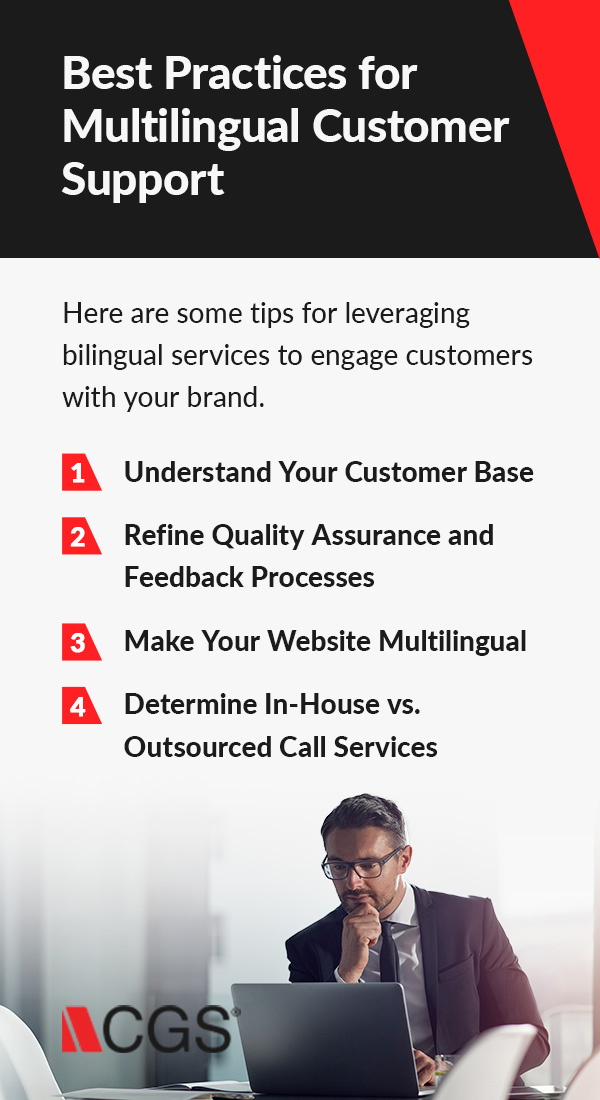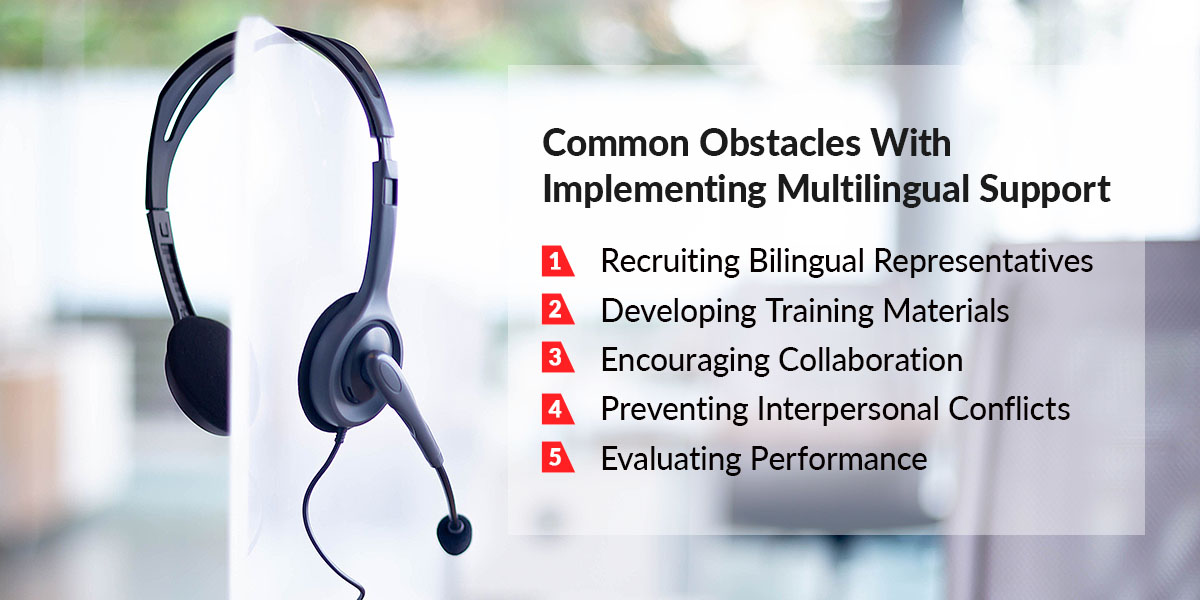Topics
Best Practices of Multilingual Call Center Services

Language and cultural barriers are among the most prevalent issues affecting call centers. When a customer service representative doesn't understand the caller's language, it can quickly lead to frustration on both ends.
Both parties must look for translations and ask each other to repeat misunderstood words, spending far more time on the phone than preferred. This communication gap can also cause errors and inaccurate information, potentially causing liability issues for the company. In many cases, the caller simply hangs up the phone in hopes of connecting with another agent who understands them.
Fortunately, multilingual call centers offer a solution to this dilemma. They enable clearer communication between customers and agents, leading to fewer errors, shorter call times, faster resolutions and more satisfied callers. Learn more about the importance and best practices regarding multilingual customer care.
What Is a Multilingual Call Center?
Unlike call centers that only offer services in one language, multilingual centers have customer service representatives who speak multiple languages. These agents field calls from different countries, switching between English and another language to assist customers as needed.
As a result, these contact centers can serve a broader range of individuals, diversifying their target market. Bilingual service agents can efficiently respond to customer requests, performing the following tasks without the complexity of language differences:
- Answering questions about products and services
- Making sales and placing orders
- Processing payments and returns
Signs to Consider a Bilingual Call Center
Here are some signs you may need to opt for multilingual call center services:
- You want to expand your operations: Are you planning to open your business to new markets and growth opportunities? If so, a multilingual contact center is important to accommodate new groups and audiences of various cultures.
- You conduct business in multiple languages: A bilingual center is incredibly helpful if you have vendors or business partners who speak a different language. If they need to reach your company, they can easily contact a representative who understands them.
- You get a lot of international calls: If you frequently receive calls from customers who speak different languages, a multilingual call center enables you to assist them instead of turning them away.

Benefits of Multilingual Support
In a survey of over 8,000 consumers from 29 different countries, 75% of participants said they were more likely to purchase from a business again if it provided customer support in their language.
Expanding your customer service language offerings can provide more efficient support, grow your consumer base and increase your organization's bottom line. Here are some benefits of multilingual call center support services.
1. Broader Reach
Due to linguistic barriers, many United States-based companies find it challenging to expand into foreign markets. Offering multilingual customer service is an excellent way to reach global markets and grow your business. You can become more recognizable and competitive by operating on an international level.
When it comes to establishing yourself in a new, non-English-speaking market, communication is essential. Making your contact center multilingual helps cultivate a more international work atmosphere, enabling you to learn about a market's preferences and needs. If you plan to expand your service areas, research the demographics and preferred languages of your current and prospective customers.
2. More Efficient Support
Calling customer support to resolve a product- or service-related issue is a dreaded process for many, especially when there's a significant communication divide.
If you want to offer faster customer support and make your operations more productive overall, hiring bilingual representatives is a step in the right direction. Multi-language support facilitates communication between the caller and the agent. Customers can explain the problem more quickly and thoroughly, which translates to more efficient support and less time spent sitting on the phone.
As a result, managers and higher-ups don't have to spend additional time attempting to resolve language complications. They can allocate their time to other tasks, making multiple departments within the contact center more productive overall.
3. Personalization
Multilingual call center services can improve your customers' experience and perception of your company. These offerings put the caller's communication preferences at the forefront rather than making them deal with an unfamiliar language. When agents can speak your customers' language, they foster a higher degree of personalized support and attention, potentially increasing your customers' satisfaction and loyalty.
4. Competitive Advantage
If a customer is choosing between two companies for their product or service support needs, they're more likely to pick the one that speaks their native language. Multilingual support can give you an advantage by resonating with a larger audience.
Ease of communication can also create a sense of familiarity, encouraging customers to consult you for support over your competitors. Your diverse support capabilities can appeal to domestic and international customers alike.
5. More Diverse Work Environment and Brand Image
Hiring bilingual service agents shows that your company embraces and values diversity. This cultural awareness can improve consumers' perception of your organization and brand image.
Multilingual customer care demonstrates your willingness to go out of your way for people of different cultures and languages. Customers will recognize and appreciate this inclusive approach. Furthermore, a multilingual call center exposes employees to people of different backgrounds, fostering a more diverse and integrated work atmosphere.
6. Increased Sales and Profits
By hiring multilingual call center service providers, you can expand your customer base by assisting callers from different cultures and regions. In turn, your business can complete more successful transactions and become more profitable.

Best Practices for Multilingual Customer Support
A study found that 80% of customers felt more connected to a brand when customer service resolved their issue. Providing this support in multiple languages can boost satisfaction and sales. Here are some tips for leveraging bilingual services to engage customers with your brand.
1. Understand Your Customer Base
Before you hire multilingual agents, you need to pinpoint the languages your customers speak. Determine who you want to reach, then research your target audience's demographics and native languages. You can even distribute surveys to members of your audience. You might ask them questions like:
- What is your native language?
- What are your region's dominant languages?
- Are you fluent in any other languages besides your native language? If so, what are they?
- What languages would you prefer we offer customer support in?
2. Refine Quality Assurance and Feedback Processes
Ongoing performance evaluations and feedback are vital aspects of quality customer service. Here are some tips for creating and honing an effective quality assurance process:
- Help managers understand their team's cultural makeup: Higher cultural awareness helps managers communicate more effectively with multilingual employees. They can provide more insightful performance feedback and understand what motivates their behavior.
- Develop standardized performance reviews: Multilingual employees can benefit from a regular rhythm, knowing what information they will receive and when. Develop performance review templates for managers and establish a platform to record and monitor progress.
- Provide multiple feedback opportunities: On top of annual or biannual reviews, leverage other mediums like ad-hoc feedback or one-on-ones.
3. Make Your Website Multilingual
Many customers prefer doing their own research to interacting with a customer support agent, especially when it comes to simple and routine inquiries. That is where a user-friendly, multilingual self-service portal comes in handy.
You can simplify the self-service process by making your website and mobile app available in multiple languages. You might include a detailed FAQ page, help center, informative blog posts or a guide with troubleshooting steps.
By curating your online content in several languages, you offer a convenient way for customers to find the answers they're looking for without calling a support line. Customers can solve their issues quickly and independently, leading to fewer customer service tickets in the long run. Your team can then devote more time to helping customers with complex requests over the phone.
4. Determine In-House vs. Outsourced Call Services
You have a key decision to make if you plan to offer bilingual customer support — creating an in-house call center or outsourcing your call services.
In-house can be costly since you have buildout, recruitment and training expenses. Unless you already have in-house call center capabilities and simply need to expand your existing resources, you'll need to start from scratch, which can strain your budget.
Outsourcing means partnering with a third-party call center that provides multilingual services. An experienced partner has the training, resources and flexibility needed to adjust to your needs. Its representatives are trained to maintain your business's procedures and policies.
There are many other benefits of outsourcing your call center services. For instance, these reps are often equipped with modern technologies — such as augmented reality (AR) and robotic process automation (RPA) — to provide more accurate and efficient support. Additionally, outsourcing call services enables you to focus on other aspects of your business, like product and service improvements.

Common Obstacles With Implementing Multilingual Support
While an in-house multilingual call center can offer valuable benefits for your organization, it's important to note the challenges that can arise. Here are some potential complications surrounding bilingual work environments, along with steps you can take to mitigate them.
1. Recruiting Bilingual Representatives
Research shows that call centers face difficulties in recruiting individuals who are proficient in multiple languages. Bilingual workers are in high demand due to their ability to reach new markets. They're sought after in numerous sectors, including customer support, hospitality and education. Nine out of 10 employers rely on workers who speak languages besides English.
Finding multilingual talent can be tricky due to the high competition for these candidates. Furthermore, advertising job opportunities can be challenging if your HR department doesn't have bilingual representatives.
2. Developing Training Materials
A single cookie-cutter training manual typically doesn't work for a multicultural workforce. This approach may be less expensive than conducting multiple training modules for employees of different backgrounds, but it's much less effective. Part of managing a bilingual contact center is meeting the needs of all team members. That includes creating training resources that everyone can understand easily.
Bilingualism alone isn't enough — each representative should have the training and resources needed to provide efficient, high-quality support. They must have the skills to use multiple platforms, communicate clearly and problem-solve. They also need to be culturally sensitive when interacting with customers worldwide.
To achieve these objectives, you'd likely need to build separate training programs to accommodate different languages. However, developing multilingual-friendly training materials can be challenging if you, your HR department or other higher-ups aren't fluent in other languages.
Hiring bilingual trainers can help you communicate all customer support policies, guidelines and procedures across your entire team. Of course, it's also another expense to account for.
3. Encouraging Collaboration
Differences in the following areas can make it difficult for multilingual employees to communicate and find common ground:
- Accents
- Traditions
- Life experiences
- Cultural backgrounds
- Languages and fluency levels
To address this challenge, involve your staff in team-building activities, events and other opportunities to connect and become acquainted with one another. This can increase employee engagement and make everyday conversation easier.
4. Preventing Interpersonal Conflicts
Every company has its fair share of conflict. However, a diverse workforce may lead to more frequent disagreements due to the larger cultural differences. Additionally, it may be more difficult for multilingual groups to resolve interpersonal conflicts, stifling productivity, creativity and your company's overall dynamic.
If you notice these issues, settle them before they spiral into larger ones. Ensure each customer service representative understands the unique abilities and value they bring to the organization. As mentioned, team activities and events can boost engagement and togetherness, helping prevent misunderstandings and conflict among employees.
5. Evaluating Performance
Robust quality assurance is key in providing top-notch customer support. It's important to evaluate agents based on their quality of work and offer consistent feedback.
However, tracking and analyzing performance can be challenging when your employees speak different languages. Again, hiring multilingual agents for quality assurance can streamline the performance evaluation process immensely, but it's also an expensive route.
As you can see, many challenges and expenses are associated with an in-house call service center. Outsourcing your customer support services can help you avoid the cost and hassle of recruiting, training and remodeling.
Speak to a CGS Outsourcing Specialist
As an award-winning customer service outsourcing company, Computer Generated Solutions can work with you to integrate bilingual support capabilities. We have multilingual call centers in the U.S., Canada, Chile, India, Israel and Romania, as well as work-from-home agents. We provide customer support in over 28 world languages.
Our representatives handle everything from routine requests to complex technical issues. They also support customers through various channels, including:
- Phone.
- Email.
- Chat.
- Web.
- AR tools.
- Social media.
Choose CGS for support outsourcing that delivers an efficient, personalized experience for your customers. Get in touch with us today to learn more about our outsourcing services.


